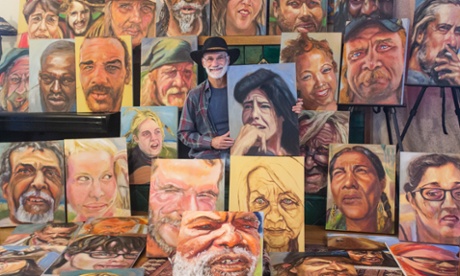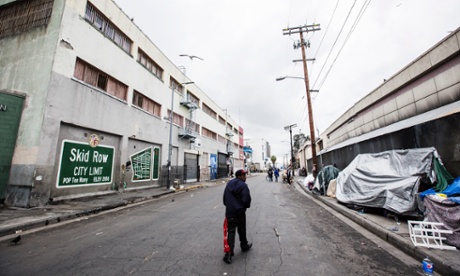The residents of Los Angeles’s Skid Row have faced many perils. Yet they haven’t, up until now, had to contend with golf-related injuries. This may change in a little over six months’ time, when a new nine-hole course is scheduled to open in this Los Angeles neighbourhood, home to as many as 6,000 of America’s homeless.
These urban fairways are not the work of some misguided sports-facility developer, but a collaboration between local artist Rosten Woo and the Los Angeles Poverty Department (LAPD), a performance art and activist group based in the area. Woo intends to create The Back 9, a playable course of nine holes inside LAPD’s Skid Row History Museum and Archive, as a way of addressing Skid Row’s current and historic zoning issues.
“The city is trying to redesign its entire zoning code,” says the 37-year-old artist, “and there’s a desire among a good number of people with power to have Skid Row rezoned.”
While Woo hasn’t settled on any clear designs for his course obstacles, he hopes his project, which recently received $50,000 from the Mike Kelley Foundation, will help Angelenos understand the way LA organises itself.
“The holes will require certain types of decision making,” he says. “There will be multiple ways to get through the course. As players navigate through the course, they will also run through the history of zoning in this area.”
And what a crooked history it is. Some believe the preservation of Skid Row, a 50-block district in downtown LA which has over the past half century offered low-cost single-occupancy dwellings, not only stymies local development, but also traps its residents in poverty. Others, such as Woo, argue the area actually serves as a kind of safety net.
“Skid Row is a recovery community,” he says. “It provides mustering of social services, when you are lost in need of some assistance; it’s a place where you can go to get back on your feet.”
Whether you agree with Woo or not, it’s hard to deny his place alongside a number of contemporary artists seeking to address real-estate issues through their art.
New Yorkers Jennifer Dalton and William Powhida are currently in the closing stages of their Month2Month project, a series of public art events held in private residences across New York City, about how class, wealth and social mobility affect people’s ability to prosper in the city.
The pair have worked together in the past and produce paintings, drawings, photographs, installations and other works individually too. However, since 7 May they have hosted a wide range of social gatherings, including a champagne reception featuring an address by the economics journalist Felix Salmon on the New York housing market; a night of communal real estate confessions, entitled Gentrifiers Anonymous; a murder mystery game called Who Stole The House?; and a remarkably modest gala dinner for developers and real estate professionals, held in Powhida’s own two-bedroom Brooklyn railroad apartment.
Month2Month is a response to the way contemporary artists are sometimes employed, unwittingly, as tools of the real estate industry. “There’s often an attempt to do art projects in areas that are being prepared for the next level of gentrification,” says Dalton.
Powhida and Dalton acknowledge that their series of open-access discussions is part of an ongoing tendency in contemporary art, sometimes described as “social practice” or “relational aesthetics”, wherein artists present novel social relationships as art. “I think the idea that relationships between people can be art is really becoming more acceptable,” says Powhida.
The duo are also alive to the work of other artists, such as Theaster Gates in Chicago and Rick Lowe in Houston, both of whom have sympathetically redeveloped rundown housing in their respective cities as part of their artistic practice.
However, these New York artists also understand the ways in which an open-minded discussion of local real estate gossip can lead on to larger topics.
“It is a way in for talking about larger inequality issues,” says Powhida, “housing becomes a lens of segregation in this country.”
“At one of our talks someone said if we don’t resolve the legacy of racial discrimination we’re not going to be able to house everyone adequately,” Dalton says. “It went pretty deep.”
Perhaps, in an age when protest marches and protest songs may not be as effective as they once were, artists such as Woo, Powhida and Dalton are finding new ways to approach social problems.
“I don’t think we’re reinventing any great model, but we’re not standing on a corner and shouting about something,” says Powhida. “Contemporary art is about ambiguity and open-endedness. If you present a talk as art, people might be a bit more willing to listen.”
Just where that conversation will go is unclear. Artists like Woo, Dalton and Powhida might be turning to housing because, in a nation where, despite growing inequalities, it is still moderately unacceptable to discuss wealth redistribution, real estate is an easy way to get less palatable and less tangible subjects on the table.
“You don’t see the people making your shirt or picking your food,” says Woo, “but you can see inequality really clearly when your neighbours change, or you yourself having to leave your apartment. It’s not the worst aspect of our particular moment in capitalism, but it is the most visible. People want to talk about it, but it’s not where I think the conversation should end. I think it does suggest it’s a way into a much larger phenomenon.”
We will have to wait and see if LA’s more open-minded golfers agree.











